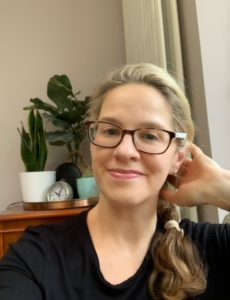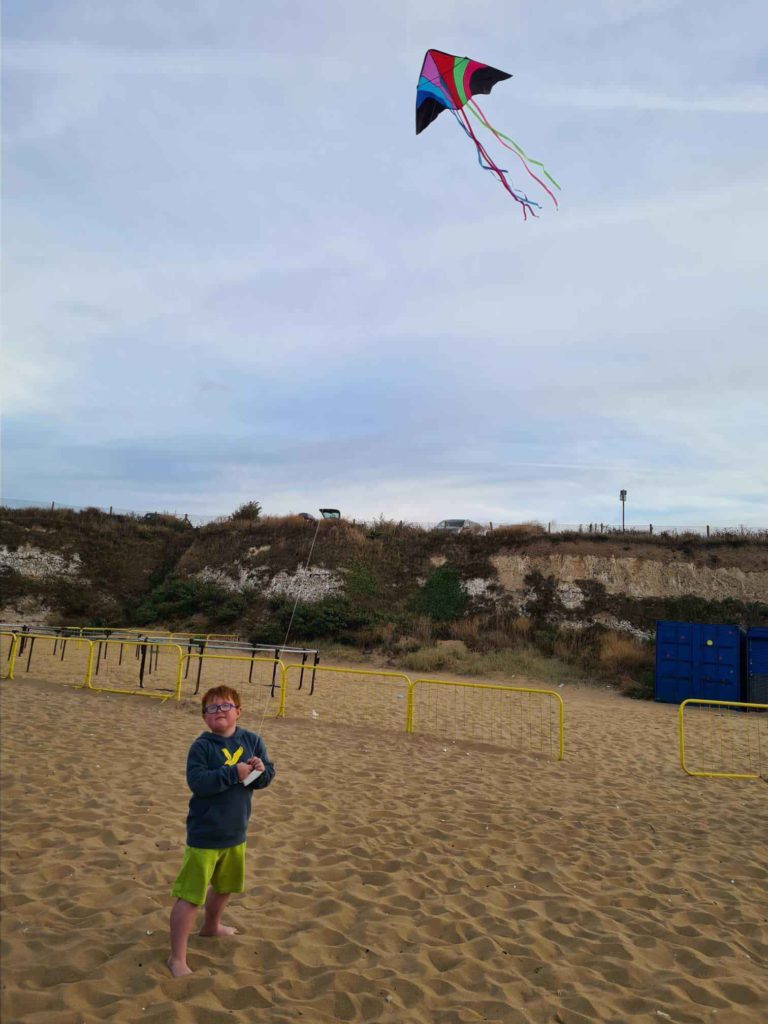
Dr Jo Griffin is a parent carer, psychologist and researcher interested in the emotional wellbeing of parents of disabled children. Her book ‘Day by Day: Emotional Wellbeing in Parents of Disabled Children’ is available on Amazon, which is based on her personal and professional experience, including doctoral research on the topic. Jo also runs the website www.affinityhub.uk which signposts to emotional support for parent carers and includes words of wisdom from other parents.
On first receiving a diagnosis for our child it can be hard to believe that we will ever come to
accept the new world in which we suddenly inhabit.
While not wanting to dismiss the pain and trauma of a diagnosis, and any associated
difficulties, it can provide hope to hear from other parent carers who may be further along the
journey than you. It helps to know that it is possible to find happiness and acceptance, not in
a way that dismisses the challenges, rather you find a way to live alongside the difficulties. A
diagnosis doesn’t mean you will never feel happy again. You will find ways to gain a greater
perspective on life and a newfound wisdom.
In my research into emotional wellbeing in parents of disabled children I spoke to many
parents about their journey and what helped them along the way. Here I share some of their
helpful experiences.
Let go of the impossible idea of perfect parenting
Let go of the idea of a perfect parent (they don’t exist) and embrace the idea of a good
enough parent. Self-compassion can help, which involves accepting that we are only
human, no one is perfect and difficult emotions can be part of life. You are doing your best
and that is good enough.
Those who constantly push themselves to be everything for everyone are at greater risk of
burnout, which, in the end, doesn’t help anyone.
Guilt, which can be a very corrosive emotion is common in parent carers. However, there is
a difference between appropriate guilt, where we have done something wrong and wish to
make amends, and inappropriate guilt where we take on responsibility for something that
does not belong to us. There are many things we cannot control such as society, service-
provision and our genes so giving ourselves a hard time about this creates additional and
unnecessary pressures and stress. Instead try to focus on what you can control, often the
small everyday things around you, and the people close to you that really matter.
Parent Carer
‘No one has it all sorted.’
Mixed emotions are part of life
Parent carers’ emotional responses are complex, varied, and – like their child – unique.
There is an increased risk for parent carers of experiencing a negative impact on their
wellbeing such as stress, depression and chronic sorrow. They may be in denial (which
might help get through the early years, but can become problematic), feel angry, helpless,
confused, jealous of non-disabled families and commonly fearful of what the future holds for
their child (Griffin, 2019).
In contrast, many parents also report having grown as a person, learning to put life into
perspective and appreciate what is really important with a new sense of purpose. Developing
greater expertise and awareness, becoming more solution focused and confident in their
ability to not only support their child, but also help others in a similar situation.
However, this is not an either/or experience. We can feel conflicting emotions at the same
time, such as:
Parent carer
‘I am relieved to have respite and also feel guilty.’
‘I am happy my child is alive and feel exhausted by my caring role.’
Parent carer
I came across the lovely Greek word Charmolypi which means ‘happiness and sadness
intermingled’ which seemed to capture the experiences of so many of the parent carers to
whom I spoke.
Mixed emotions can be exhausting and confusing though. It can help to frame these
opposing and oscillating emotions as an understandable reaction to an unexpected situation.
You are not alone in feeling them.
‘I just accept that this is how I feel, this is what I need right now and allow myself that experience.’
Parent Carer
NB: If, however, you are experiencing persistent sadness and are unable to feel pleasure or
take interest in activities over a longer period of time then it might be you are tipping into
depression. If so, it may help to seek support from your GP.
Celebrate the inch stones
While all parents compare and celebrate their child’s milestones, these may take on a
different texture for parents of disabled children. Parents experience enormous pride and
joy in the child’s achievements, however comparatively small, delayed or different they may
seem to others. Parents told me how they ‘celebrated the inchstones’ that were unique to
them and their family. Often recognising the indomitable human spirit of such moments.
“There are such moments of pure joy that come from having a disabled child.
Seeing my son at the park, facing a vertical ladder that he knows he cannot go up, yet finding his
own way to get up to the top so that he can go down the slide.Simply witnessing the pure joy on his face as he does a ‘thumbs up’….such magic and a moment in which I feel great pride and joy.
I often wonder if he did not live with his disability if he would have such resilience and tenacity at such a young age.”
Victoria Young, Duchenne Parent Carer
Recognise how far you’ve come
Sometimes we are so caught up in the day to day busyness of being a parent carer we miss
opportunities for reflection on the bigger picture. Take a moment to stop and take stock.
Notice how far you’ve come, how much you’ve managed and recognise your strengths.
‘I’ve become better at recognising when my mood is starting to sink and doing things that help me’.
Parent carer
When we realise that we have coped through difficult times it increases our ability to manage
in the future. We know that we can survive. That’s not to say it’s easy, but we recognise our
strength and having confidence in our ability to cope becomes a self-fulfilling prophesy.
Self-care Swiss army knife
Families are a system and each part of the network affects the other parts. Your own
wellbeing is key – not just so that you can better support your child (although this is the
case) but also for your own sake. Having a range of go-to tools can support us in the tough
times, and the good.
Parents I spoke to for my research reported a huge variety of things that helped them: a
coffee with a friend, playing music, walking in nature, mindfulness, doing things unrelated to
parenting, taking up new hobbies or connecting with things they used to do before having
children.
‘It could be all manner of things, bath, yoga or getting out of the house and whatever, just a change of environment & situation.’
Parent carer
What works will be personal to you and your situation. It may change over time and different
things may help at different points. I refer to parents needing to develop a Swiss army knife
of self-care. You need to have flexibility to recognise what you need and have a toolkit at
your disposal to implement support.
Worry controller
Of course, there are worries as a parent, particularly when your child has a life-limiting
condition. But there is a time to think of the future, for example, when you need to make
plans or big life decisions, but there is also a time to ‘park’ the worries so they don’t get in
the way of your enjoyment of the here and now.
Parents I spoke to had found ways to develop what I call a ‘worry controller’ (like an air traffic
controller). This involves deciding when you will think about things, and when you may put
something to one side to think about when you have more time or the necessary resources.
This can stop worries from becoming overwhelming.
Celebrate your newfound wisdom
‘It’s opened my eyes to a world that is normally hidden’.
Parent Carer
You will develop the skills and knowledge you need to see you and your family through. In
the early years this can be hard to recognise but hold onto hope that it will be possible in the
future. It won’t always be easy and there will be continuing challenges along the way but
there is a path out of darkness.
Victor hugo
Even the darkest night will end and the sun will rise
Research shows that the majority of people are resilient, and can find ways to manage
despite traumatic events and setbacks. Knowing that we, as human beings, are resilient can
help us realise it’s not just the toughest, most well-resourced, people who survive and thrive
– it is a possibility for all of us.
Sometimes we may need a bit of help along the way though, often from others who have a
shared or similar experience, and that’s ok too. In fact, many parents go onto help other
parents in order to share what they have learnt along the way and find this enormously
rewarding.
Lizzie Deeble, Duchenne Parent Carer
“From the first phone call, I felt completely understood and supported. Speaking to other DMD parents who work for Action Duchenne has truly been a lifeline for me, and they have never wavered in their support and patience.”
Griffin, J. (2019). A report into the Emotional impact of parenting a disabled child. March 2019,
Researchgate, DOI: 10.13140/RG.2.2.15565.08169 (also on www.affinityhub.uk)


 Edgewise announces FDA authorisation for Phase 2 clinical trial
Edgewise announces FDA authorisation for Phase 2 clinical trial
